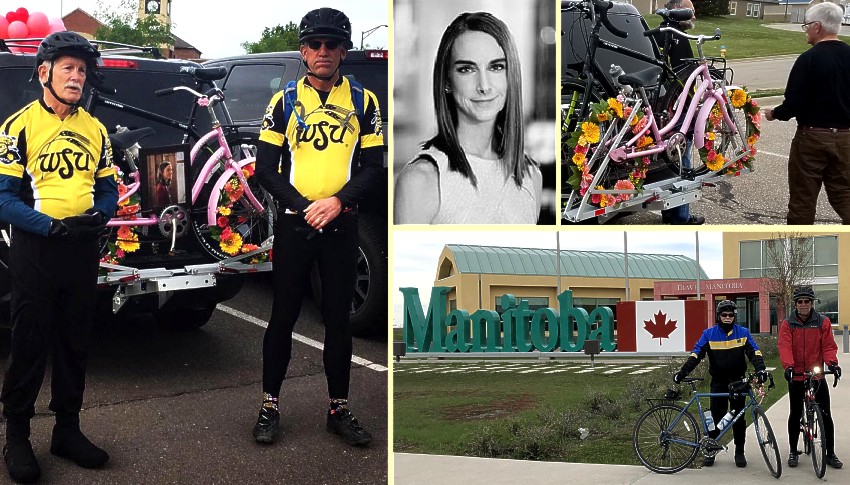Kansas Snapshots by Gloria Freeland - June 28, 2019
From Wichita to Winnipeg
This past May, a Wichita father cycled 925 miles from Wichita, Kansas to Winnipeg, Canada to raise money for the National Eating
Disorder Association (NEDA). But it wasn’t just an effort for a good cause. For him, it was personal. He was doing it in memory of
his daughter Bridget, who died a year ago from anorexia, depression and chronic pain. And it wasn’t the first time he made the journey.
Three years ago, he bicycled to raise money for the Alzheimer’s Association to honor his father, who suffered from the disease.
We bumped into him and his companions on the first leg of their trip after a family dinner at the Brookville Hotel near Abilene,
Kansas. As the rest of us were settling into our cars with full stomachs in anticipation of the ride home, husband Art noticed a pink
bicycle on a nearby van. Its wheels were decorated with flowers, and he walked over to get a closer
look.
He was startled when a man appeared around the corner of the van. Art asked, “I assume there is some kind of story here?” There was,
but the response was far from the happy tale he had expected and he shared it with me on our way home.
Paul and Carolyn Harrison, friend Rick Stephens, and Paul’s brother Kelly had started at Wichita State University that morning on
their way north. They dubbed their campaign “Bridget’s Wreath” in honor of Bridget, who died at the age of 34. Carolyn
created the pink bike with the flower-bedecked wheels.
Paul is a retired trauma surgeon. His daughter followed in his footsteps, becoming a hand surgeon and an assistant professor of
plastic surgery at the Baylor College School of Medicine in Texas. She was fluent in Spanish and loved to travel, especially to Spain.
Paul said Bridget suffered from her eating disorder from an early age. His hope is that sharing Bridget’s story will keep other
families from losing a loved one in a similar fashion.
According to NEDA, eating disorders have the highest mortality rate of any mental health concern. And unlike most health problems,
the symptoms can vary widely. Some might be expected, such as preoccupation with weight, closely watching calories, frequent dieting,
skipping meals, refusal to eat certain foods, discomfort eating around others and extreme concern with body size and shape. Others
provide few clues and just appear to be personal oddities, including excessive chewing; extreme mood swings; noticeable fluctuations
in weight; stomach cramps; dizziness, especially upon standing; feeling cold; sleep problems; muscle weakness; dental problems; yellow
skin; and impaired immune functions. Those with eating disorders might steal food or hoard it in strange places; create schedules to
make time for binge sessions; feel disgust with themselves, depression or guilt after overeating; and have low self-esteem. Like
Bridget, many are otherwise unusually high-functioning people.
After the ride, Paul shared some of his thoughts with me:
Ten days on the bike with endless pavement ahead provided a lot of time to think. The road conditions were not conducive to tandem
riding, so conversation was usually at a minimum. Riding on country roads that usually had a minimal shoulder required constant
observation of the pavement in front of you for obstacles as well as monitoring the traffic in your rear-view mirror for safety. My
thoughts in Nebraska were frequently, “are the hills ever going to end?”
All the time Bridget was in my thoughts. Not just on the ride. I can’t help wonder what could’ve been done ... what I could have done
to change the course of her illness. During the ride, I started to focus more on the benefit of the awareness and education connected
to Bridget’s WREATH and less on the fund-raising. The funds we raised for the National Eating Disorders Association will have an
impact, but the education and awareness will have an impact on a far greater number of people.
I thought about how much I miss my baby girl and how much her mother and her sisters miss her. When the physical challenges became
difficult, I recalled pictures of Bridget ... pictures of a smiling 5-year-old at her birthday party ... pictures of a happy young
woman on a sailboat, along with many other memories that were pushed to the back of my mind during her painful struggles with her
disease.
Paul said the road to Winnipeg was primarily through farm country. He was impressed with the vastness, but was overwhelmed when he
saw the damage done by spring flooding. He said in Nebraska, many roads were gone, which required significant “work-arounds” and in
South Dakota, “what looked like boat ramps were actually roads disappearing into flooded fields.”
But he said they were fortunate in terms of weather conditions. They were able to ride north of one major storm, missing its rain
and snow, although at some points they had temperatures less than 40.
They were also fortunate in the people they met along the way.
We met incredibly hospitable, kind and supportive people at every stop ... almost every one we talked to had knowledge of a person
with an eating disorder ... The farmer that passed us in his gigantic tractor and then met us at the café and wrote us a check. The
Stevensons, in Winnipeg, who lost a daughter to an eating disorder, welcomed us into their home, provided a wonderful dinner and
media coverage the next morning ... The barista at a Starbucks in Winnipeg was a psychology major doing research on eating disorders
...
Three days after the ride, Paul and Caroline went to Spain to scatter Bridget’s ashes in one of the places she loved most. Paul said
it will take some time to process what he experienced on the ride, but it helped him to know that he could think about his daughter,
share her struggles, and perhaps help others along the way.
